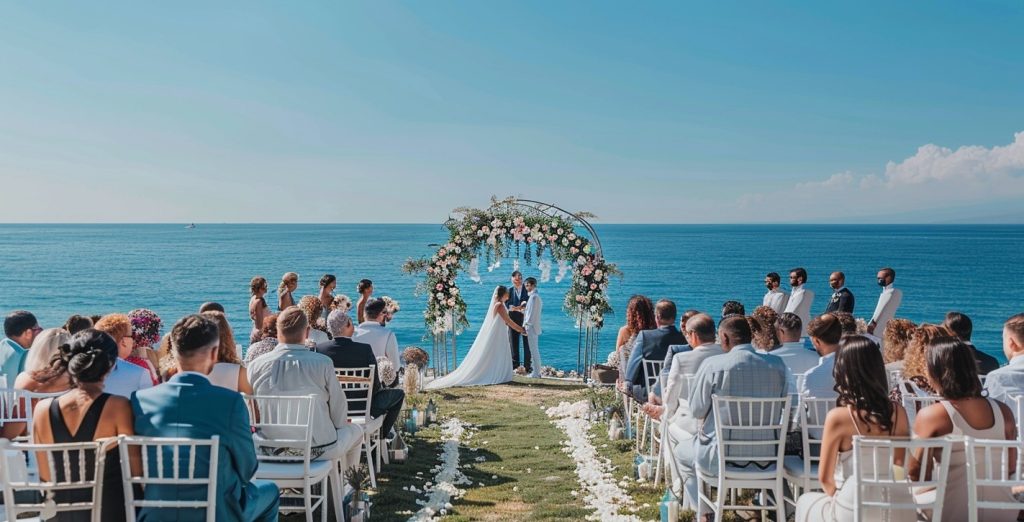Planning a wedding abroad can feel like an exhilarating yet daunting adventure. You’ve got to pick that perfect destination that really speaks to your love story while also juggling a bunch of legal requirements—definitely not a walk in the park!
This guide is here to help you navigate those essential steps. We’ll talk about setting a budget, hiring a wedding planner, and figuring out those cultural nuances that can pop up.
Whether you’re dreaming of a beachside ceremony or a charming vineyard, this guide will give you the insights you need to make your destination wedding truly unforgettable.
1. Choose the Perfect Destination
Choosing the perfect destination for your wedding is a big deal; it sets the tone for your special day and shapes the experience for you and your guests. Whether you’re dreaming of a tropical beach, a historic castle, or a charming vineyard, the right venue will enhance your wedding theme and create unforgettable memories. You’ll want to think about things like accessibility, local customs, and the type of wedding you envision.
When evaluating potential locations, check out the travel arrangements for both you and your guests. Consider flight availability, local transportation options, and nearby accommodation choices.
Getting to know the culture of the area is just as important. Local traditions and customs can really enrich your ceremony and add unique touches to your celebration.
Remember, the venue you choose not only sets the overall theme and decor but can also spark creative ideas that reflect the setting. For example, a rustic barn might inspire a vintage theme, while a beach backdrop could lead you toward a laid-back, coastal vibe.
By bringing all these elements together, you can create a celebration that truly resonates with everyone involved.
2. Set a Budget
Setting a budget is a crucial first step in your wedding planning journey. It helps you allocate funds wisely across all the important aspects of your big day, from the venue to catering services and photography.
As you dive into this financial adventure, it’s key to prioritize each category based on what matters most to you and your partner. Start by pinpointing those must-have elements, like your dream venue or that photographer you’ve been eyeing, before you jump into vendor quotes.
Don’t forget to stash away a little extra for those surprise expenses that always seem to pop up, like last-minute decor or accommodating extra guests. Many vendors offer wedding packages that can save you a pretty penny, so take some time to research and compare your options. This can really elevate your overall experience without sacrificing quality.
3. Research Marriage Requirements
Researching the legal requirements for marriage in your chosen destination is crucial. It ensures you have all the necessary paperwork, like a marriage license or wedding permits, sorted out before the big day.
This means you need to understand the specific documents required, such as proof of identity, residency statements, and maybe even divorce decrees if you’ve been married before. Plus, you’ll want to get familiar with the waiting periods, which can really vary from one place to another.
For example, some countries might take several days to issue a license, while others could let you tie the knot on the same day. And don’t forget about local customs—things like mandatory premarital counseling or unique traditions could shape your entire wedding experience.
So, it’s definitely worth diving deep into the legal landscape to avoid any last-minute surprises.
4. Hire a Wedding Planner or Coordinator
Hiring a wedding planner or coordinator can really take a load off your shoulders when it comes to wedding planning. They bring expertise in vendor selection, timeline creation, and day-of coordination, making sure everything runs smoothly.
With their extensive knowledge of local vendors, you’ll have access to top-notch options for everything from florists to photographers, ensuring every detail fits your vision perfectly. Plus, by managing guest experiences, the coordinator helps create a fun and enjoyable atmosphere, so you can focus on celebrating your love.
Don’t forget to add personal touches to the planning process, like unique themes or customized favors, to make the event truly unforgettable. And using various planning tools and online resources can further streamline everything, giving you helpful checklists and inspiration that make the whole experience even better.
5. Book Accommodations for Guests
Booking accommodations for your guests is a key part of planning a destination wedding. You want to make sure everyone has a comfy place to stay and can enjoy the local attractions while they’re in town.
From luxurious hotels that pamper with top-notch service and amenities to laid-back resorts that give off a chill vibe, you’ve got tons of options to fit your guests’ different tastes and budgets. Rental properties, like cozy villas or stylish apartments, can also add a unique touch, especially for families or larger groups that might appreciate having a little extra space to hang out together.
When you’re organizing group travel arrangements, it’s super important to keep your guests in the loop about these options so they can find what works best for them. Plus, thinking about nearby local attractions while planning accommodations not only enhances their experience but also sets the stage for some fun shared adventures, making the whole trip unforgettable.
6. Plan for Transportation
Planning for transportation logistics is crucial to make sure your guests arrive at the wedding venue on time, especially in a destination setting where unfamiliar roads and unpredictable weather might be a factor.
To ease any potential stress, think about offering shuttle services that can whisk guests directly from their accommodations to the venue. This not only makes things more convenient but also creates a fun, communal vibe.
If some guests want a bit more freedom to explore the area during their stay, rental cars can be a great option. It’s also smart to put together a detailed travel itinerary that outlines all transportation methods, times, and even an emergency backup plan in case the weather decides to throw a fit.
Letting guests know about possible alternative routes or additional ride-sharing options can help keep everyone on track, no matter what surprises come their way.
7. Decide on a Wedding Date
Deciding on your wedding date means juggling a bunch of factors like weather, cultural traditions, and your personal preferences—each of which can really shape your destination wedding experience.
Getting a handle on local customs can help you align your big day with important dates or festivals and show respect for community practices. Plus, checking the climate during different months can save you from surprise rain showers or extreme heat that could put a damper on the festivities. It’s also smart to consider your guests’ availability, especially if many of your loved ones will need to travel.
Don’t forget about peak seasons, which usually bring higher costs and bigger crowds, along with planning for potential weather backups. Taking all this into account will lead to a smoother experience. Ultimately, nailing down the right timing will help ensure that both you and your guests have a memorable celebration.
8. Choose Vendors and Suppliers
Choosing the right vendors and suppliers is key to bringing your wedding vision to life. From picking out catering options and photography services to securing entertainment that fits your wedding theme, every detail matters.
To effectively source and evaluate local vendors, you might want to start by making a list of potential candidates. Dive into online research, browse social media, and ask for word-of-mouth recommendations from friends and family.
Once you have your shortlist, take some time to check out reviews on various platforms. This will help you gauge the experiences of previous clients. Don’t hesitate to reach out to past customers for personal references; their feedback can give you valuable insights into the reliability and quality of the service.
Arranging face-to-face meetings or tastings is a great way to see if a vendor’s style and personality vibe with your expectations and overall wedding aesthetics.
9. Plan for Cultural Differences
Planning for cultural differences is key when you’re organizing a destination wedding. Understanding local customs and wedding traditions can really enhance the experience for you and your guests.
By taking the time to learn about and respect the specific values and rituals of the host culture, you can create a more inclusive atmosphere that honors everyone attending. This approach not only enriches the celebration but also fosters a sense of unity among diverse groups.
To seamlessly weave in local traditions, think about collaborating with a local wedding planner. They can provide valuable insights into everything from traditional ceremonies to what attire might be appropriate.
And don’t forget about the food! Including local cuisine in your wedding menu not only tantalizes taste buds but also bridges gaps between cultures. This thoughtful approach makes sure that every aspect of your wedding resonates with significance and joy.
10. Prepare for Any Legal Documents or Paperwork
Preparing all your legal documents and paperwork is super important to make sure your wedding abroad is valid and recognized. This includes securing a marriage license and knowing how to get your marriage certificate.
On top of those key documents, you should really get familiar with the specific regulations of your chosen destination, since requirements can vary a lot. For example, some places might ask for proof of citizenship, while others could require documents like identification, witness information, or even translations in the local language.
To dodge any last-minute headaches, it’s wise to have all your paperwork ready and verified before the big day. This is especially important for the officiant, who needs to make sure everything is compliant with local laws. Understanding all this not only makes the ceremony smoother but also guarantees that your marriage will be legally binding and recognized back home.
What Are the Benefits of Having a Destination Wedding?
Having a destination wedding opens up a world of benefits for you. It’s all about creating unique experiences for your guests and giving them the chance to travel alongside you, all while adding those personal touches that reflect your love story in a breathtaking setting.
If you’re looking for an intimate gathering, this kind of wedding allows for deeper connections among your friends and family. With fewer guests, you’ll find those interactions feel much more meaningful. Plus, the thrill of adventure is hard to resist! You and your guests can explore new places and dive into diverse cultures.
Imagine discovering hidden beaches, savoring local delicacies, or going on thrilling excursions together—these shared experiences will turn into cherished memories. And let’s not forget about the stunning backdrops! They’ll provide the perfect visuals for photography, capturing those special moments in a way that traditional venues just can’t match.
In the end, a destination wedding isn’t just a ceremony; it’s an unforgettable adventure for everyone involved.
What Are the Challenges of Planning a Wedding Abroad?
Planning a wedding abroad definitely comes with its own set of challenges. You’ll need to navigate language barriers, understand local legal requirements, and manage travel arrangements for your guests.
On top of that, finding reliable local vendors can feel like a Herculean task, especially since they might have different standards and expectations. You might also be grappling with time zone differences, which can really complicate communication and decision-making.
Making sure you comply with local laws and regulations means doing some diligent research. You might even consider hiring a local consultant to help you through the complexities.
To tackle these issues effectively, you can use online platforms to vet vendors and project management tools to keep track of timelines across those pesky time zones. It’s also super helpful to set up clear communication channels, like regular video calls, and have a local point of contact who can assist with all the legal stuff.
How Can One Save Money on a Destination Wedding?
You can definitely save money on a destination wedding with some savvy budget planning, smart vendor choices, and by taking advantage of wedding packages that deliver value without skimping on quality.
By thinking carefully about when to hold the event, you can snag some serious savings with off-peak season discounts that many venues offer. All-inclusive packages are a great way to simplify costs, covering key elements like catering, decor, and entertainment at a lower price.
Don’t be shy about negotiating with vendors; many are willing to adjust their prices or throw in extras if they sense your commitment and excitement. Plus, exploring lesser-known locations can lead you to hidden gems that are both charming and affordable, making your dream wedding not just a fantasy, but a financially doable reality.
What Are the Top Destinations for a Wedding Abroad?
The top destinations for a wedding abroad range from sun-soaked beaches to enchanting castles, each offering unique experiences that perfectly match current wedding trends and your preferences as a couple.
For example, you might find yourself drawn to the stunning shores of Bali, where lush landscapes and vibrant sunsets create a romantic backdrop. If you’re leaning more towards history, the grand palaces of Italy, rich in cultural heritage, might just enchant you. Meanwhile, the breathtaking vineyards of France offer an idyllic setting with rolling hills and exquisite wines that’ll elevate any celebration.
Then there are the iconic cliffs of Santorini, where you can say “I do” against the dramatic blue sea—perfect for those unforgettable photographs. Each of these locations not only showcases stunning views but also brings a wealth of local traditions and hospitality, enriching your overall wedding experience.
What Are the Must-Have Items for a Destination Wedding?
When you’re planning a destination wedding, there are some must-have items that definitely need to be on your wedding checklist. Think bridal attire, wedding rings, and all those travel documents to keep everything running smoothly.
It’s super important to think about practical items that can really make or break your day. For instance, having emergency contacts—like local vendors and the nearest hospital—on hand can help you tackle any unexpected hiccups.
Don’t forget about weather backups! Packing umbrellas or having alternative indoor venues ready can give you peace of mind if the skies decide to open up.
And let’s not overlook a well-organized toolkit. Stock it with basic supplies—adhesive bandages, sewing kits, and maybe a few snacks—to keep things running smoothly during the hustle and bustle of the event.
By preparing these essentials, you can focus on enjoying your special day without all the stress.
Frequently Asked Questions
What are the first steps in planning a wedding abroad?
The first steps in planning a wedding abroad are choosing a location, determining a budget, and selecting a date. It is important to research the legal requirements for getting married in the chosen country and to consider any cultural or language barriers.
How do I select the perfect location for my wedding abroad?
When selecting a location for a wedding abroad, it is important to consider the climate, accessibility, and cultural significance of the destination. It is also helpful to have a local wedding planner or coordinator who can assist with finding the right venue and accommodations.
What are the common challenges when planning a wedding abroad?
Some common challenges when planning a wedding abroad include coordinating travel arrangements for guests, navigating different time zones and languages, and dealing with potential weather or logistical issues. It is important to have a backup plan in case of any unexpected hiccups.
How can I save money when planning a wedding abroad?
To save money when planning a wedding abroad, consider choosing a less popular destination or getting married during the off-season. It is also helpful to negotiate prices with vendors and to limit the guest list to close friends and family.
What are some unique cultural traditions I can incorporate into my wedding abroad?
Incorporating local cultural traditions into your wedding abroad can add a special touch to your celebration. Some ideas include incorporating local cuisine, music, and customs into the ceremony and reception. You can also consider incorporating traditional attire or decorations into your wedding.
Do I need to have a legal ceremony in my home country before or after my wedding abroad?
This depends on the legal requirements of the country where you are getting married. In some cases, it may be necessary to have a legal ceremony in your home country before or after the wedding abroad. It is important to research and understand the legalities beforehand.



